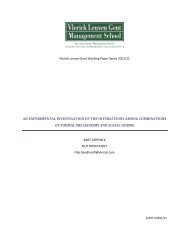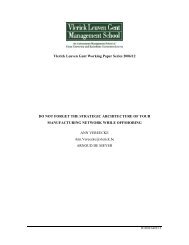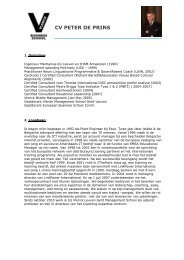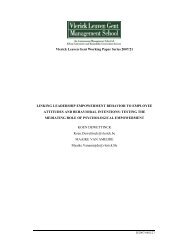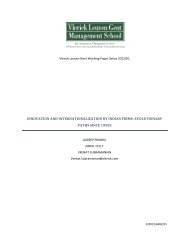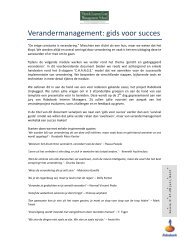Vlerick Leuven Gent Working Paper Series 2007/03 ... - Vlerick Public
Vlerick Leuven Gent Working Paper Series 2007/03 ... - Vlerick Public
Vlerick Leuven Gent Working Paper Series 2007/03 ... - Vlerick Public
Create successful ePaper yourself
Turn your PDF publications into a flip-book with our unique Google optimized e-Paper software.
Agency theorists believe that managers (agents) may pursue opportunistic behaviour<br />
which may be in conflict with the goals of the owners (principals) and hence destroy<br />
shareholder wealth. Advocates of the agency approach see the board of directors as “an<br />
economic institution that helps to solve the agency problems inherent in managing any<br />
organization” (Hermalin and Weisbach 2000:1). Put differently, the board of directors is one<br />
of the internal control mechanisms designed to address the conflicts of interest between<br />
managers and shareholders and to bring their interests into congruence (Walsh and Seward,<br />
1990). Within this context, a board of directors is the guardian of shareholders’ welfare and<br />
fulfil the critical tasks of hiring, firing and compensating the CEO (top management) and to<br />
ratify and monitor important decisions (Fama and Jensen, 1983).<br />
The service role of the board of directors primarily stems from a resource dependence<br />
view and - in second order - from stewardship theory. A careful reading of the literature<br />
however reveals that the service role of the board is not uniformly approached. From a<br />
resource dependence perspective, which is mainly grounded in sociology and organizational<br />
theory, the board of directors is seen “as a vehicle for co-opting important external<br />
organizations with which the company is interdependent” (Pfeffer and Salancik, 1978).<br />
Within this context, Mintzberg (1983) distinguishes at least four service roles of the board of<br />
directors: (1) co-opting external influencers, (2) establishing contacts (and raising funds) for<br />
the organization, (3) enhancing the organization’s reputation and (4) giving advice and<br />
counsel to the organization. In particular, the latter refers to the board’s potential to provide<br />
high-level advice to the CEO (Jensen, 1993; Dalton et.al., 1998). However, an alternative<br />
approach of the service role, mainly based on stewardship theory, excludes legitimacy and<br />
resource dependence functions in favour of strategic engagement. According to stewardship<br />
theory, managers are good stewards of the company assets. Managers do not misappropriate<br />
corporate resources at any price because they have a range of non-financial motives, such as<br />
the intrinsic satisfaction of successful performance, the need for achievement and recognition<br />
etc.. Given the absence of self-interested behaviour by managers, the issue becomes to what<br />
extent organizational structure facilitates the aspiration of management for high performance<br />
(Donaldson and Davis, 1991; Muth and Donaldson, 1998). As opposed to agency theory,<br />
stewardship theory represents a consensus perspective and rejects the notion that the board is<br />
a disciplining mechanism to align conflicts of interest between shareholders and managers. In<br />
fact, proponents of the stewardship school of thought see the board of directors as an<br />
important strategic device.<br />
11



